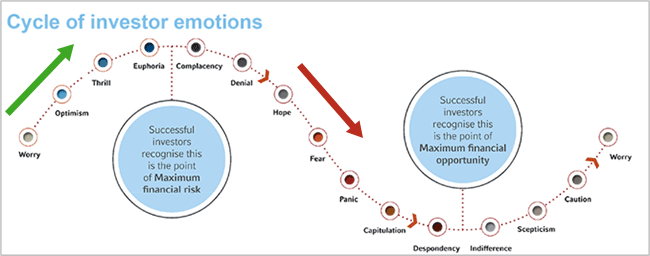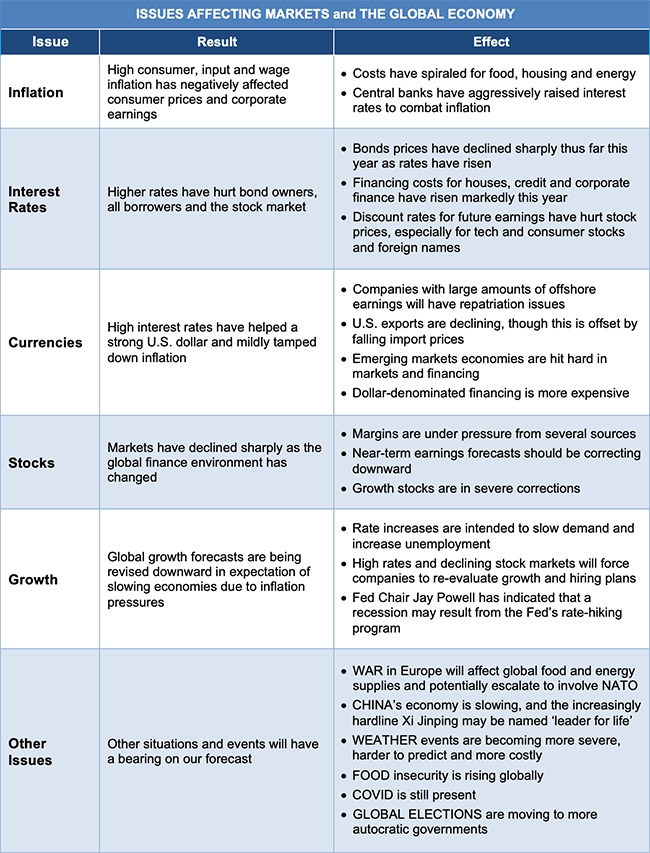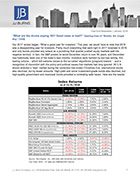“I’m keeping the faith / Yes I am / You know I’m keeping the faith, oh yes I am” Billy Joel, “Keeping The Faith”
The rollercoaster market behavior this year has led the financial media to consult a thesaurus to find the right terms to accurately describe this environment. We think a great description was offered by The Financial Times’ Martin Wolf, who, with classic British understatement, described the situation both in the U.K. and the world as ‘profoundly tumultuous.’ Tumult implies confusion and turbulence, and often promotes emotional swings to investors’ collective psyche that can ultimately cause imprudent behavior. We often emphasize that successful investing is dependent on (among other things) sound emotional behavior with respect to portfolio management. We have found that the best way to illustrate how market results and emotions are linked is by using the graph below:

Of particular note this year is the very rapid emotional descent investors have experienced from euphoria / complacency (green arrow) to capitulation / despondency (red arrow). The markets have been barraged with conflicting data and policy shifts that have been difficult to digest. This means rational forward-looking decisions have been very challenging to execute, and we expect this uncertainty to continue for at least the next few quarters.
We see the major issues confounding investors as follows:

For more comments and details on these issues, please refer to our previous three newsletters:
Q2 2022 Market Summary, Q1 2022 Market Summary, and Q4 2021 Market Summary.
As perpetual optimists (which is not the same as perpetual bulls), we still see positive things about the markets and the economy.
- First, the markets as we understand them are functioning well. During the Global Financial Crisis of 2008-09 and the COVID pandemic in 2020, there were systemic issues with global financial institutions that necessitated intervention. Regulatory and behavioral changes have occurred since both of those events, and we’re not currently operating under any restrictive issues despite unhappiness with equity prices and bond yields.
- The global economy was profoundly shocked by the COVID-19 pandemic, and the book is not yet closed on the disease. Many economic and behavioral changes occurred / are occurring, some large and visible, others small and largely unnoticed. Almost three years on, we have thankfully returned to a strong resemblance of pre-pandemic normal in the U.S. and other developed nations. As we work through these changes, however, we expect there to be further disruptions in various markets and economies, especially with respect to work and compensation.
- The U.S. economy and most other major economies—despite dire predictions and negative thinking—are not yet in recession. There does seem to be one on the horizon, but the robust job market and consumer behavior are keeping things afloat for the time being. We are often reminded that just because we think we’re in a recession does not make it so, especially without substantial headline job losses. The job market, at least in the U.S., still appears robust and U.S. inflation appears to be at a near-term (if not absolute peak).
So where does this leave investors? It seems evident that there is further turbulence ahead, and, as we noted above, the likelihood of rolling regional recessions. As we often note to our clients, we should always focus on things we cancontrol (which include our emotions) and focus much less on things we can’t control (markets and policy). Referring back to our chart on the market-emotion cycle, we are clearly closer to capitulation and a period of capturing opportunity than we are to market-top euphoria. Much of the analysis we currently see projects financial re-calibration for the next nine-to-fifteen months, with expectations that the Fed may pause but not end its rate hikes given economic and markets conditions. This implies a number of entry points for investors over this period; the key is to take advantage of them.
Keeping these comments in mind, some of our recent conversations with and questions from clients have been very focused on this emotional disquiet. As always, we encourage everyone to remain invested, as market bottoms never announce themselves in the financial media, and to instead focus on things that we can control. Specifically, these include:
- Re-examining goals and time horizons as appropriate.
- Maximizing tax-loss harvesting opportunities.
- Prudently deploy long-term capital into equity markets by dollar-cost averaging.
- Reconsidering and possibly delaying any debt financings.
- Consider possible changes to allocations with respect to the ratio of stocks to bonds in portfolios.
- Reevaluate cash positions to ensure adequate reserves for the next 12 to 18 months.
We continue to look for places to reallocate capital, take losses and rebalance portfolios. Given that stocks and bonds have declined in tandem and almost to the same level, rebalancing is not as robust a tool thus far in the cycle, but changes in policy will likely provide excellent future opportunities.
Finally, we appreciate that these are trying times for investors and it is very easy to get caught up in the daily emotions of the market and lose sight of the bigger picture. Concentrating on the near-term level of the S&P 500 or the Dow Jones Industrial Average is not a prudent investment strategy. Also, drawing a “line in the sand” for your portfolio value and saying that “I am selling if it drops below that line” is not a sound philosophy, either. Your JJB team has weathered a number of these downturns over the decades, and focusing on the value inherent in financial planning and not deviating from our process has served our clients well during these time periods. Market drops are common, and can at times be steep, because emotions take hold causing investors to rethink their entire strategy. Once the emotions have settled, investors then turn their focus to earnings and valuations of companies and a market bottom is formed. It is important to note that once the selling has subsided, expectations are lowered and uncertainties have been resolved, and the market has always grown to new highs.
Please contact us with any questions or concerns you may have, and thank you for the trust you place in us.
—Your Wealth Management Team at JJ Burns & Company
Download Market Commentary
Disclosure: J.J. Burns & Company, LLC is a registered investment adviser with the U.S. Securities & Exchange Commission and maintains notice filings with the States of New York, Florida Pennsylvania, New Jersey, Connecticut, Georgia, Illinois, North Carolina, and California. J.J. Burns & Company, LLC only transacts business in states where it is properly registered, or excluded or exempted from registration. Follow-up and individualized responses to persons that involves either the effecting or attempting to effect transactions in securities, or the rendering of personalized investment advice for compensation, as the case may be, will not be made absent compliance with state investment adviser and investment adviser representative registration requirements, or an applicable exemption or exclusion.
All investing involves risk, including the potential for loss of principal. There is no guarantee that any investment plan or strategy will be successful.
The foregoing content reflects the opinions of J.J. Burns & Company, LLC and is subject to change at any time without notice. Content provided herein is for informational purposes only and should not be used or construed as investment advice or a recommendation regarding the purchase or sale of any security. There is no guarantee that the statements, opinions or forecasts provided herein will prove to be correct.
Past performance may not be indicative of future results. Indices are not available for direct investment. Any investor who attempts to mimic the performance of an index would incur fees and expenses which would reduce returns.
Securities investing involves risk, including the potential for loss of principal. There is no assurance that any investment plan or strategy will be successful.


